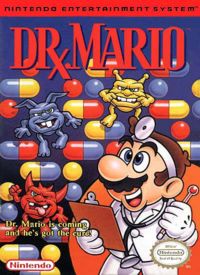Difference between revisions of "Dr. Mario"
WarioFan63 (talk | contribs) m |
WarioFan63 (talk | contribs) |
||
| Line 39: | Line 39: | ||
*In 2009, a similar remake to the above was released as [[DSiWare]], called ''Dr. Mario Express''. | *In 2009, a similar remake to the above was released as [[DSiWare]], called ''Dr. Mario Express''. | ||
| − | [[Category: NES Games]] [[Category: Game Boy Games]] [[Category: Arcade Games]] [[Category: Super Nintendo Games]] [[Category: Game Boy Advance Games]] [[Category: Mario Games]] [[Category: Classic NES series]] [[Category: | + | [[Category: NES Games]] [[Category: Game Boy Games]] [[Category: Arcade Games]] [[Category: Super Nintendo Games]] [[Category: Game Boy Advance Games]] [[Category: Mario Games]] [[Category: Classic NES series]] [[Category: Puzzle Games]] |
Revision as of 18:06, 19 January 2010

| |
| Dr. Mario | |
| Developer | Nintendo R&D 1 |
| Publisher | Nintendo |
| System | NES Game Boy Arcade SNES Gameboy Advance |
| Release Date | NES JP July 27, 1990 US October 1990 EU June 27, 1991 Game Boy JP July 27, 1990 US December 1990 EU April 30, 1991 Arcade 1990 SNES JP June 1, 1998 GBA JP May 21, 2004 US October 25, 2004 EU January 7, 2005 |
| Gallery | GH Gallery |
| Rating | ESRB: E |
Dr. Mario is a puzzle game featuring Mario in the role of a doctor eliminating viruses. It was released simultaneously for the NES and Game Boy in 1990. Since then Dr. Mario has been ported to nearly every Nintendo system.
Story
Dr. Mario, after going on several wild adventures, has begun working at the Mushroom Kingdom Hospital's virus research lab with Princess Peach as his nurse. However, an experiment gone wrong causes several viruses to replicate quickly. Luckily Dr. Mario has invented a new vitamin that he thinks can destroy the viruses.
Gameplay
Similar to Tetris, Dr. Mario tosses several vitamins into a jar that takes up most of the screen. The jar is filled with viruses, each being one of three colors (red, blue or yellow). Each vitamin also has two colored segments. The point is to align and move the vitamins as they fall so that four vitamins and viruses of the same color are aligned, destroying all four. The game advances to the next level when all viruses are destroyed.
Legacy
Several more Mario-based puzzlers such as Tetris Attack and Yoshi's Cookie were made over the years. However, none became as popular as Dr. Mario. Dr. Mario is well-known for its addictiveness and catchy music that rivals even Tetris itself. This has led to the game being frequently rereleased.
Ports and Rereleases
- In 1990, an arcade version was released as part of the Vs. Multisystem. It was the last game in the Vs. Multisystem line.
- A Super Nintendo version was released packaged with Tetris as Tetris & Dr. Mario in 1994. This was only released in America and Europe.
- In 1998, Dr. Mario was released for the Super Nintendo in Japan as part of the Nintendo Power system.
- Dr. Mario 64 was released for the Nintendo 64 in 2001, in America only. Dr. Mario 64 contained the original game as well as a new four-player mode and a Story Mode with appearances by Wario and various characters from Wario Land 3.
- A version of Dr. Mario appeared as an unlockable in 2003's WarioWare, Inc.: Mega Microgame$ in 2003. This version was called Dr. Wario and replaced the Dr. Mario sprite with one of Wario.
- Dr. Mario was released for the Gameboy Advance as part of the Classic NES Series.
- In 2005 it was again released for the Gameboy Advance, this time packaged with Puzzle League (a character-less version of Panel de Pon) as Dr. Mario & Puzzle League.
- In 2007, Dr. Mario was included in Brain Age 2: More Training in Minutes a Day! under the name Germ Buster.
- In 2008 a remake was made for WiiWare known as Dr. Mario Online RX. The game features an online multiplayer mode where characters can play as their Miis.
- In 2009, a similar remake to the above was released as DSiWare, called Dr. Mario Express.